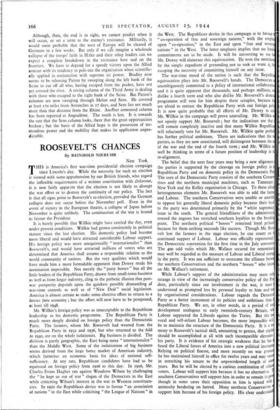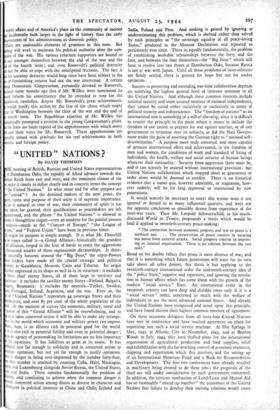ROOSEVELT'S CHANCES
By REINHOLD NIEBUHR New York.
THIS is America's first war-time presidential election campaign since Lincoln's day. While the necessity for such an election is viewed with some apprehension by our British friends, who regard the inflexible requirements of a written constitution with disfavour, it is now fairly apparent that the election is not likely to disrupt the war effort or to destroy the continuity of our policy. The fact is that all signs point to Roosevelt's re-election, provided the German collapse does not occur before the November poll. Even in the event of victory in the European theatre, a collapse of Japan before November is quite unlikely. The continuation of the war is bound to favour the President.
It is barely possible that Willkie might have carried the day, even under present conditions. Willkie had grown consistently in political stature since the last election. His domestic policy had become more liberal and would have attracted considerable Labour support. His foreign policy was more unequivocally " internationalist " than Roosevelt's, and would have attracted millions of voters who are determined that America shall assume a responsible relation to the world community of nations. But the very qualities which would have made him a more formidable opponent than Dewey made his nomination impossible. Not merely the "party bosses" but all the little leaders of the Republican Party, drawn from small-town business as well as from larger industry, cling to the pathetic illusion that post- war prosperity depends upon the quickest possible dismantling of war-time controls as well as of "New Deal" social legislation. America is almost certain to make some- abortive effort to return to a laissez faire economy ; but the effort will now have to be postponed, at least till 1948.
Mr. Willkie's foreign policy was as unacceptable to the Republican leadership as his domestic programme. The Republican Party is much more deeply divided on foreign policy than the Democratic Party. The farmers, whom Mr. Roosevelt had weaned from the Republican Party in 1932 and 1936, but who returned to the fold in 1940, are on the whole isolationist. Big business is divided. The division is partly geographic, the East being more " internationalist " than the Middle West. Some of the isolationism of big business seems derived from the large home market of American industry, which furnishes an economic basis for ideas of national self- sufficiency. At any rate, Republican candidates have had to be equivocal on foreign policy from 1916 to this day. In 1916, Mr. Charles Evans Hughes ran against Woodrow Wilson by challenging the "he kept us out of war" slogan of the Democrats in the East while criticising Wilson's interest in the war in Western constituen- cies. In 1920 the Republican device was to favour "an association of nations" in the East while criticising "the League of Nations" in the West. The Republican device in this campaign is to favour "co-operation of free and sovereign nations," with the emp upon "co-operation," in the East and upon "free and sover nations" in the West. The latter emphasis implies that no bin commitments are to be made. It will be interesting to see Mr. Dewey will elaborate this equivocation. He won the nomina by the simple expedient of pretending .not to seek or want it, th escaping the necessity of committing himself on any issue.
The war-time mood of the nation is such that the Republi equivocation plays into Mr. Roosevelt's hands. The Democrats unambiguously committed to a 15olicy of international collaboratio and it is quite apparent that thousands, and perhaps millions, dislike a fourth term and who also dislike Mr. Roosevelt's dome programme will vote for him despite these scruples, because are afraid to entrust the Republican Party with our foreign po • It is now quite probable that all efforts of Mr. Dewey to Mr. Willkie in the campaign will prove unavailing. Mr. Winkle not openly support Mr. Roosevelt ; but the indications are that will remain completely inactive and that many Willkie Republi will reluctantly vote for Mr. Roosevelt. Mr. Willkie quite proba has further political ambitions. There are indications that the parties, as they are now constituted, will disintegrate between the of the war and the end of the fourth term ; and Mr. Willkie well be thinking in terms of a future position of leadership in re-alignment.
The belief that the next four years may bring a new alignment the parties is supported by the cleavage on foreign policy in Republican Party and on domestic policy in the Democratic P The core of the Democratic Party consists of the southern Conse tives and the northern municipal machines, such as Tammany New York and the Kelley organisation in Chicago. To these alr heterogeneous elements Mr. Roosevelt was able to add the f and Labour. The southern Conservatives were unable or unwi to oppose his generally liberal domestic policy because their lo) to the party was determined primarily by the "white supremacr issue in the south. The general friendliness of the administrar toward the negroes has stretched southern loyalties to the break point. The northern political " bosses " remained loyal primr because for them nothing succeeds like success. Though Mr. Roo, velt lost the farmers in the 1940 election, he can count on continued support of Labour. Labour was officially represented the Democratic convention for the first time in the July conven The 400 odd votes which Mr. Wallace secured for renomina may well be regarded as the measure of Labour and Liberal su in the party. It was not sufficient to overcome the alliance be the southern Conservatives and the northern " bosses " who in on Mr. Wallace's retirement.
While Labour's support of the administration may seem ra strange in view of the increasingly conservative policy of the Pi dent, particularly since our involvement in the war, it must understood as prompted less by personal loyalty to him and by organisational considerations. Labour regards the Demeas Party as a better instrument of its policies and ambitions than Republican Party. We are, in other words, in a period of development analogous to early twentieth-century Britain, Labour supported the Liberals against the Tories. But the vocal and self-reliant Labour becomes, the more impossible will be to maintain the structure of the Democratic Party. It is a I mony to Roosevelt's tactical skill, amounting to genius, that an should be accomplished at all with such incompatible elements his party. It is evidence of his strategic weakness that he has fused the Liberal forces of America into a new political inst Relying on political finesse, and more recently on war press he has maintained himself in office for twelve years and may su in stretching his tenure to the unprecedented length of s years. But he will be elected by a curious combination of rdl voters. Labour will support him because it has no alternative. southern Conservatives will support him in order to remain in though in some cases their opposition to him is spiced with animosity bordering on hatred. Many northern Conservatives support him• because of his foreign policy. His clear tmderstan
world affairs and of America's place in the community of nations y incidentally bulk larger in the light of history than the early vements of his administration in domestic policy.
There are undeniable elements of greatness in this man. But thing will avail to maintain his political authority after the con- sion of the war. His various reluctant supporters are bound to out amongst themselves between the end of the war and the d of the fourth term ; and even Roosevelt's political dexterity I not be able to cope with the anticipated frictions. The fact is his uncanny dexterity would long since have been subject to the of diminishing returns had not the war intervened. A certain ng Democratic Congressman, personally devoted to Roosevelt, tared some months ago that if Mr. Willide were nominated he Id inform his constituency that he intended to vote for the ublican candidate, despite Mr. Roosevelt's great achievements.
e would justify this actiort by the fear of the chaos which might cur in Washington between the close of the war and the end of e fourth term. The Republican rejection of Mr. Winkle has oubtedly prompted 'a revision in the young Congressman's plans. t his fears are fairly typical of the apprehensions with which many cast their votes for Mr. Roosevelt. These apprehensions are rurally mixed with gratitude for his real achievements in both estic and foreign policy.



























 Previous page
Previous page